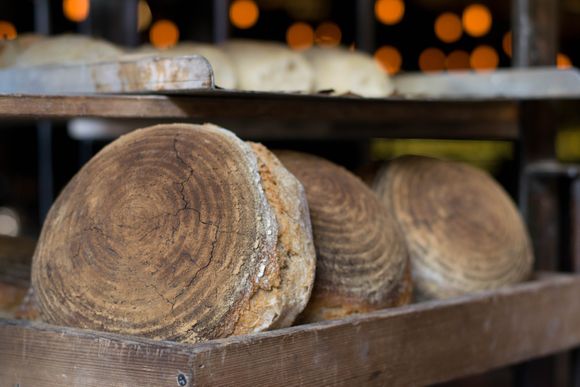Author: Silvia Marinova, PhD student in the Genomic Stability Laboratory at BAS
Undoubtedly, the gluten-free diet has become increasingly popular over the past few years. Many conflicting opinions and articles about it can be found, ranging from one extreme to another. Some argue that the gluten-free regime is a "panacea" for everything, and another that there is no point in it and even that it is "harmful".
As with most current affairs, the truth is somewhere in between. Therefore, in this article we will consider what are the scientific justifications for these claims, and in particular - the relationship between the gluten-free diet and Hashimoto's disease.
What is Hashimoto's disease
Hashimoto's disease (also known as Hashimoto's thyroiditis) is a thyroid disease. It is located at the base of the neck in front of the trachea and releases special substances (hormones) that control functions of the body such as:
- Body temperature
- Metabolism
- Growth
With this disease the body attacks the thyroid gland by mistake and thus disrupts its proper functioning, most often slowing down the production of hormones - a condition called hypothyroidism.

The thyroid gland is located at the base of the front of the neck
Symptoms and risk factors for Hashimoto's disease
Hashimoto's disease is more common in women between the ages of 40 and 60, but can occur at any age, as well as in men. Risk factors for Hashimoto's are of a complex nature and include genetic predisposition, intestinal permeability, environmental factors, lifestyle, etc.
Also, there is an increased risk of developing the disease if you suffer from another autoimmune condition [ref. 1] such as:
- Type 1 diabetes
- Celiac disease [ref. 2]
- Psoriasis, etc.
As for symptoms, Hashimoto's disease is a progressive condition, which means that it develops slowly, and at first you may not have complaints.
Most often, the first sign of the progression of the disease is an increase in the size of the thyroid gland, a condition known as "goiter". Other common symptoms include:
- General tiredness and fatigue
- Muscle weakness
- Increased sensitivity to the cold
- Constipation
- Weight gain, etc.
What are the genetic causes for Hashimoto's disease
Variations in several genes have been studied as possible risk factors for Hashimoto's thyroiditis. These genes are:
- CTLA4
- HLA-DRB1
- PTPN22
- SLC26A4
- Tg
Some are part of a family called the Human Leukocyte Antigen Complex (HLA), which helps the immune system distinguish the body's own proteins from proteins produced by viruses and bacteria.
Other genes that are associated with Hashimoto's thyroids help regulate the immune system or participate in normal thyroid function. It is believed that most of the genetic variations that have been found have little impact on a person's overall risk of developing this condition. [ref. 12]
What diet to follow if have Hashimoto's disease

After examining what Hashimoto's disease is, it is normal to ask if there is a treatment. There is no such thing, but it can be controlled with medication prescribed by a doctor. It also turns out that following a certain diet is extremely important and has a positive effect [ref. 3-5] For example, it is known that you need to increase the amount of foods containing iodine, selenium, vitamin D in your diet.
Moreover, many people say that the gluten-free diet improves the condition of people with Hashimoto's [ref. 6]. But let's first get acquainted with the mysterious "gluten".
What is gluten and how your body reacts to it
Gluten is a protein contained in wheat, barley and rye. You will find it in most types of bread, pasta, pizza, biscuits, cereals. What is important to know about it is that it can cause a toxic response of the body in people who have:
- Allergy to gluten
- Celiac disease
- Gluten sensitivity
What is celiac disease and is it related to Hashimoto's thyroiditis
Celiac disease occurs in only 1% of the population and is characterized by a high sensitivity to gluten. People who suffer from this autoimmune disease should follow a 100% gluten-free diet.
When gluten, and in particular gliadin (a major part of gluten) gets into the digestive tract [ref. 7], it causes the release of a substance called zonulin. It disrupts the tight contact between the cells of the small intestine and increases the so-called intestinal permeability.
The higher it is, the more harmful particles (such as viruses and bacteria) can enter the bloodstream. This activates a violent autoimmune response that attacks the wall of the small intestine. This leads to disorders in the absorption (malabsorption) of selenium, iodine (risk factors for Hashimoto's disease) and other substances, as well as the appearance of concomitant autoimmune diseases [ref. 8].
It is the malabsorption of micronutrients important for the thyroid gland, as well as the hypersensitivity of the immune system that could increasingly explain the appearance of the two diseases together.

What is non-celiacal gluten sensitivity
There is also a condition known as non-celiacal gluten sensitivity. It is also characteristic of symptoms such as swelling, gas, abdominal pain, constipation, diarrhoea, fatigue, muscle pain, etc. It is manifested by gluten consumption in people who do not suffer from celiac disease and are not allergic to gluten.
Unfortunately, there are not enough studies yet to explain its root cause. In addition, there are claims in the literature that attribute these symptoms to other "non-gluten" substances found in wheat. Therefore, some prefer to use the term "non-celiacal sensitivity to wheat".
However, there are suggested hypotheses and studies that show that non-celiacal gluten sensitivity is associated with other autoimmune diseases such as Hashimoto's [ref. 9]. For example, a study [ref. 10] involving the University of Palermo, Italy, showed that 29% of a group of patients with non-celiacal gluten sensitivity developed an autoimmune disease compared to 4% in the control group.
Is the gluten-free regime helpful if you suffer from Hashimoto's disease
After all considered, in conclusion we can say that while it has not been confirmed whether adherence to a gluten-free regimen lowers the risk of developing autoimmune diseases, there are studies that show that some people suffering from Hashimoto (with or without celiac disease) feel an improvement when switching to gluten-free mode [ref. 5].
So, if you have Hashimoto's disease, it is best to consult your doctor, who may appoint you a gluten sensitivity test. They could also advise you to try the so-called "eliminating" diet by stopping gluten consumption for a certain period of time and keeping track of whether you feel any improvement. When you put gluten back on your menu, the missing complaints should reappear if they are due to its consumption. If symptoms return, the bad news is that you'll need to consider switching to a gluten-free diet.
In itself, this is a very difficult task. However, with the popularity of this regimen, more and more recipe ideas and substitutes are becoming available on the internet. This will make the process considerably easier, and some of the alternatives are actually very tasty and easy. To convince you, we will share with you how to prepare something traditional and at the same time useful - gluten-free pie [ref. 11].
Recipe for gluten-free pie

- 50g rice crusts for spring rolls
- 3 eggs
- 150g goat cheese (or other)
- 100 ml carbonated water
- 50g butter
Bake at 180 degrees for about 40 minutes. Enjoy your meal! :)
